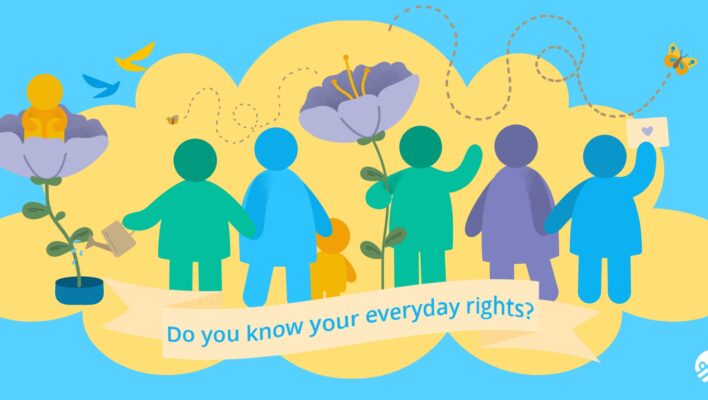Do you know your “everyday rights”?

Food on the table, decent work, the opportunity to build a family, a safe home free from mould — these are not luxuries or privileges. They are the everyday rights that provide the foundation for a life of freedom and dignity.
What are “everyday rights”?
“Everyday rights” is a term being used more and more by civil society organisations to refer to Economic, Social, and Cultural Rights (ESCR). These rights are not abstract ideals. They concern the most basic conditions of daily life and are recognised under international human rights law as essential for living in dignity and freedom.
In 1976, The UK Government ratified the International Covenant on Economic, Social, and Cultural Rights (ICESCR). In other words, this means the the UK Government has committed to not only recognise but also fulfil these rights for ever person in the UK.
The Covenant includes a total of 31 Articles. These are the main ones:
- The right to work — including fair wages, safe conditions, and protection against unemployment.
- The right to social security — ensuring support in times of need, such as illness, disability, unemployment, or old age.
- The right to adequate food, clothing, and housing — recognising the basic material conditions for survival and wellbeing.
- The right to health — including access to healthcare, clean water, and safe living environments.
- The right to education — from primary school to higher education, enabling personal development and participation in society.
- The right to take part in cultural life — recognising that cultural identity and expression are vital aspects of human dignity.
- The right to family life — ensuring that the widest possible protection and assistance is accorded to families.
A gap in UK protections
Despite ratifying ICESCR nearly 50 years ago, the UK has never incorporated these rights into domestic law. Unlike civil and political rights, ESCR are not protected under the UK’s Human Rights Act.
This means that when everyday rights are violated — when families are left in unsafe housing, when workers are trapped in insecure jobs, when access to healthcare is impeded — people cannot turn to UK courts for justice. The government’s commitments exist on paper, but not in practice.
Why this matters
Everyday rights are not abstract legal commitments — they are lifelines.
When these rights are denied, people are left in cycles of insecurity and fear. As our 2018 research Understanding Poverty in All its Forms captured:
“Poverty means being part of a system that leaves you waiting indefinitely in a state of fear and uncertainty.”
For people living in poverty, this uncertainty is not occasional: it is daily. Unsafe housing and insecure employment are not temporary hardships, but systemic violations of rights. Marginalised communities, already facing discrimination, are hit hardest by these failures.
What can we do about it?
For more than 60 years, we at ATD Fourth World have been working together with people in poverty whose everyday rights are violated every day. Most of these violations are hidden from the public eye, due to the systemic silencing of people living in poverty.
We believe that lasting change comes from shared knowledge and collective action. That means:
- Listening first to people with lived experience of poverty, and ensuring their voices lead the conversation.
- Building alliances with civil society organisations, academics, and human rights defenders to push for recognition of everyday rights in UK law.
- Raising awareness so that the wider public understands that issues like poor housing and exploitative working conditions are not unfortunate circumstances but violations of human rights.
- Challenging oppressive systems that normalise insecurity and inequality, and advocating for policies rooted in dignity and justice.
Everyday rights are human rights. They are as vital as the right to free expression or a fair trial. Without them, true equality and freedom are impossible.
In March 2025, ATD Fourth World addressed the UK government about everyday rights in two ways:
- With a report on how poverty impacts children’s social care and the right to family life. This led the government to admit that there are problems. We are offering them advice about solutions.
- As part of GRIPP (Growing Rights Instead of Poverty Partnership), we submitted a separate report about issues with the rights to social security, to work and to an adequate standard of living. GRIPP also has meaningful solutions to propose.
At ATD Fourth World, we know that poverty is not inevitable: it is the result of political choices.
Together, we can choose differently. Together, we can ensure that everyday rights are respected, protected, and fulfilled for all.

